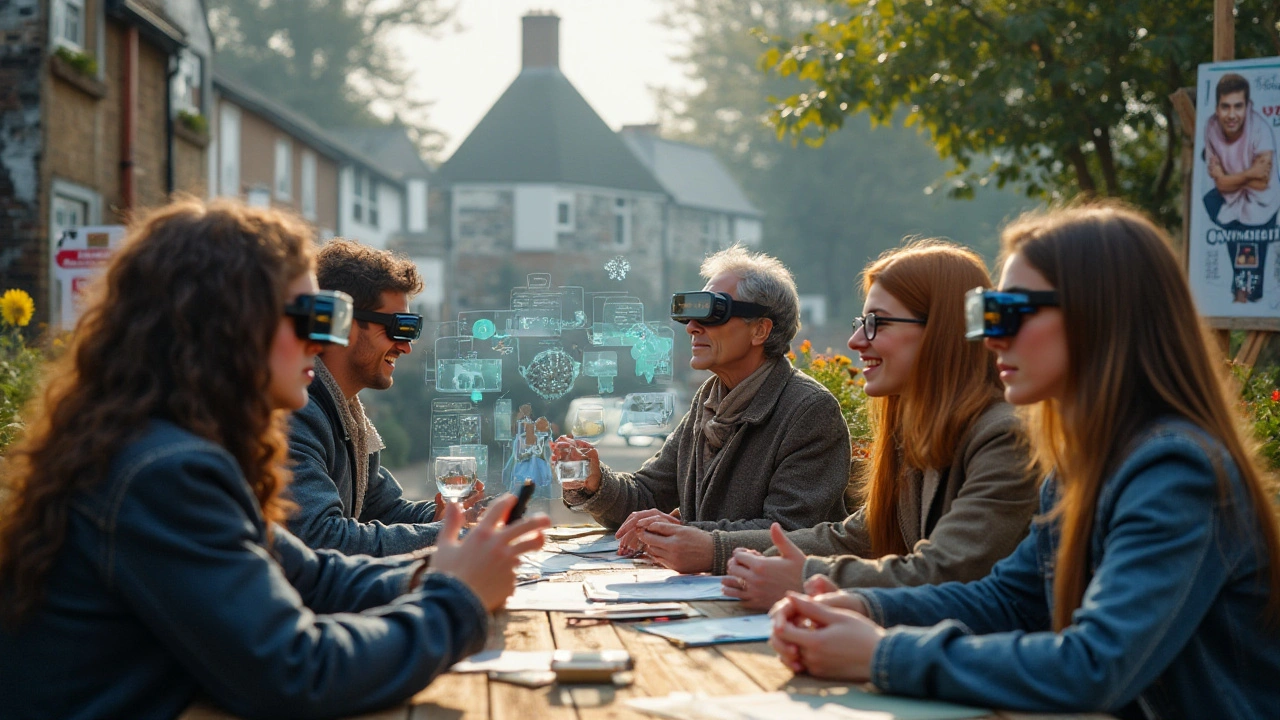The digital world is buzzing with excitement about the changes that AI, like ChatGPT, is bringing to social media. It's not just about connecting with friends anymore; these platforms are evolving into dynamic arenas for creativity, learning, and communication. With the help of ChatGPT, conversations online are becoming more engaging and meaningful, offering users personalized experiences that feel both intuitive and interactive.
Social media platforms are constantly seeking new ways to keep their audiences engaged. By implementing AI, users can now discover content that's more aligned with their tastes, making every scroll feel tailored and relevant. Additionally, the ability of AI to provide instant responses and facilitate real-time interactions is redefining what it means to be connected online.
As we look to the future, the possibilities seem endless. From content creators gaining new audiences to individuals finding communities that resonate with them, AI is opening doors we hadn't even imagined before. It's essential to understand how platforms might change as we integrate more artificial intelligence into our daily digital lives, ensuring that these tools enhance our online presence and foster genuine human interaction.
- Transforming User Engagement
- Content Curation and Discovery
- Personalization in Communication
- The Future of AI-Driven Social Platforms
Transforming User Engagement
In the rapidly evolving world of social media, engagement is the golden key. ChatGPT is now paving the way for a new era where interaction is at the forefront, making online experiences richer and more vibrant. Traditional platforms have long relied on user-generated content to drive traffic, but with the integration of AI, users are seeing a more dynamic form of engagement. People today don't just want to consume content; they want to participate actively in conversations, and ChatGPT is standing out by facilitating more interactive engagements. By offering real-time feedback and suggestions, AI enhances the user experience by aligning discussions with user interests and preferences, making online interactions more relevant and captivating.
A transformative impact of ChatGPT on user engagement is its ability to moderate and maintain discussions in a more effective manner. Previously, the task of managing comments and interactions fell heavily on human moderators, often leading to delays and inconsistencies. With AI, this process is streamlined. It uses complex algorithms to identify disruptive behaviors or inappropriate content, ensuring that conversations remain constructive and on topic. Moreover, this AI-driven moderation also minimizes the risk of human error, allowing users to engage in safer online environments.
Social media platforms are also leveraging AI to boost personalized experiences. By analyzing user data and online behavior patterns, ChatGPT can tailor user feeds to display content that matches individual preferences and activities. This personalization not only enhances user satisfaction but also fosters a sense of connectedness with the platform. When people see content that resonates with them, they are more likely to comment, like, or share, significantly increasing overall platform engagement.
New Opportunities for Content Creators
With AI at their disposal, content creators find themselves at the crux of a limitless potential for audience engagement. ChatGPT can suggest trending topics, predict audience responses, and even offer content optimization tips. This partnership between AI and human creativity results in content that is not only relevant but also engaging for audiences worldwide. Creators, especially those new to the scene, can harness AI's predictive insight to hit the bullseye with every post.
"AI won't replace content creators but will be their most powerful ally," suggests a recent report by the Social Media Research Institute.
| Feature | Benefit | Impact on User Engagement |
|---|---|---|
| Real-time Feedback | Instant suggestions and engagement | Higher user satisfaction and interaction |
| AI-Driven Moderation | Safe and regulated platforms | Increased user trust and activity |
| Content Personalization | Customized user experiences | Boosted activity and platform loyalty |

Content Curation and Discovery
In the sprawling universe of social media, where everyone vies for a spot in people's feeds, AI like ChatGPT is proving to be a game-changer in content curation and discovery. This smart technology sifts through massive amounts of data, finding patterns and learning preferences, all to present users with content that's relevant and timely. It's a bit like having a personal guide who knows just what you'd love to see, read, or watch next. By understanding user interactions and engaging with the unique nuances of content, these AI systems tailor the social media experience, making it more personalized and less overwhelming.
When it comes to discovery, social media used to be like wandering aimlessly in a vast city without a map. But now, it feels more like a curated gallery, where each piece feels intentionally placed. This is largely due to advanced algorithms working behind the scenes. According to a 2022 report by McKinsey, about 35% of what consumers purchase on Amazon and 75% of what they watch on Netflix come from product recommendations. Social media platforms are adopting similar strategies, using AI to suggest groups to join, videos to watch, and articles to read, based on known user behaviors and preferences.
One fascinating aspect of AI-driven social media is its ability to not just keep up with trends but actively help create them. Consider TikTok's algorithm, which has been praised for its uncanny ability to surface content that can go viral out of nowhere. The algorithm sifts through billions of videos to push content to people who are most likely to interact with it, thus catapulting unknown creators to fame overnight. This is more than chance; it's a meticulously crafted interaction, guided by layers of machine learning and big data analysis.
"AI has provided us the ability to traverse an otherwise impossible landscape of information, identifying patterns no human could," says Greg Brockman, co-founder of OpenAI. This shift towards machine-led curation allows users not only to access what interests them but to explore worlds they wouldn’t naturally wander into. From niche hobbies to underrepresented voices, the vast reach and precision of AI systems enable discovery on an unprecedented scale.
What does this mean for content creators? The playing field is being leveled in a way. Smaller creators now can reach a large audience just as easily as big brands, provided their content resonates with the target segment identified by AI. It's not just about having the highest quality production, but about finding the right niche with the right messages. AI encourages quality and authenticity, values that users increasingly look for amidst the clutter.
Looking ahead, as the algorithms powering ChatGPT become even more sophisticated, the landscape will continue to evolve. Imagine a platform that understands if you're in the mood for something light after a long day or ready for deep reading with your morning coffee. It’s a bold, new world shaped increasingly by precise, proactive AI that makes online interaction feel almost human again. Yet, as we lean into this future, the importance of digital literacy cannot be overstated. Users must stay informed about data usage and algorithmic biases, ensuring that AI serves to enhance our lives, never manipulate or limit them.

Personalization in Communication
ChatGPT is revolutionizing how we communicate on social media by adding a personalized touch that feels as if the conversation was meant just for you. This tool taps into the magic of AI to help craft responses that are not only contextually relevant but also engaging and relatable. Whether you're chatting with a friend or engaging with a brand online, the ability for AI to understand and mirror your tone is unprecedented. This level of personalization isn't something we saw in the earlier days of social media, where interactions were often broad and generic.
The notion of personalization extends beyond just responding; it’s about anticipating what users might need. By analyzing past interactions, ChatGPT can predict the types of content or conversations that individuals might find enjoyable. Imagine logging onto your favorite social platform and instantly receiving tailored recommendations for articles, videos, or discussion threads that align with your interests. This shift towards an enriched, personalized experience has been made possible thanks to AI's data-processing capabilities combined with an understanding of human behavior patterns.
The biggest part of AI's potential comes from its ability to adapt and learn. As AI continues to evolve, it will be able to refine its predictions and become even more precise in delivering what users want, essentially acting as a digital concierge of sorts. — Industry Analyst
But why does this matter? Personalized communication ensures that users feel seen and heard, which is crucial in today's fast-paced digital world. People are more likely to engage with content that resonates with them personally, meaning they’ll spend more time on a platform that values their unique voice and preferences. This engagement is vital not only for personal satisfaction but also for businesses aiming to build and maintain relationships with their audience.
From a commercial perspective, personalization helps in crafting marketing strategies that hit closer to the target. Brands can utilize AI tools like ChatGPT to tailor their messages, making them more appealing to specific demographic segments, which potentially increases conversion rates. Consider a scenario where a brand, using AI insights, learns about a user's love for sustainable products and engages them with communication centered around their ecological impact. This kind of targeted outreach can foster brand loyalty and enhance customer satisfaction.
Challenges and Opportunities
Despite these advancements, the journey towards hyper-personalized communication does come with its set of challenges. One significant concern is privacy. With AI pulling data to personalize user experience, there’s an ongoing debate about how much data is too much and where to draw the line in terms of user privacy. Striking a balance between personalization and privacy becomes a tightrope walk that must be navigated carefully. As users, understanding these mechanisms can help demystify how our data is being used while allowing us to enjoy a more tailored social media experience.
As more platforms integrate ChatGPT or similar AI technologies, the capacity for personalization grows. Future developments could see social media not merely as a tool for communication but as a personal companion enhancing everyday life. Imagine a platform that not only records your interactions but comprehends your motives, preferences, and even emotions, creating an environment that feels uniquely yours. It's exciting to think about where this technology will lead us, allowing for a future that becomes more individual yet connects us on a broader level through shared, meaningful interactions.

The Future of AI-Driven Social Platforms
Imagine logging into your favorite social media platform and being greeted not just by posts from friends and influencers, but by a curated experience that feels as if it knows you. This vision is becoming a reality as ChatGPT and similar AI technologies are being embedded into the very fabric of social platforms. AI isn't just a tool for automation, it's a transformative force that is shaping the very way users interact with digital spaces, blending personalized content with seamless communication tools.
One of the exciting trends heading into the future is the role of AI in content moderation. Social media companies face significant challenges in determining what content should remain and what violates community standards. AI algorithms can efficiently analyze text, images, and even video, identifying hate speech, misinformation, and other harmful content far quicker than human moderators. This not only ensures safer platforms but also encourages more open and trustworthy environments.
Moreover, AI evolution is facilitating the rediscovery of personalized content. Using AI-driven recommendations, users are exposed to posts, articles, and videos that align closely with their interests and past interactions. This precision in content delivery keeps users engaged longer and encourages them to interact more deeply with content producers, enhancing the creators' relevance and reach. It's a cycle that benefits both users and platform ecosystems, paving the way for more influencers and niche communities to thrive.
The Social Listening Advantage
AI's ability to analyze massive amounts of user data also contributes significantly to the emerging field of social listening. This phenomenon enables companies to observe public sentiment about their brand, strategize more effective marketing campaigns, and even predict trends before they arise. With insights drawn from keywords and user interactions, brands harness these findings to tailor-make approaches that resonate with the public, making social conversation a pivotal component in business strategy.
AI-driven social platforms also democratize knowledge-sharing. They create spaces where users can easily access educational content and tap into expert advice. Using sophisticated algorithms to guide users to the right communities, these platforms act as conduits for learning and discussion, nurturing a culture of continuous personal growth and shared knowledge.
Nick Bostrom, a philosopher well-known for his thoughts on AI, once remarked, "Machine learning allows us to build systems that improve over time, without human intervention." As AI evolves, its capacity to enhance how we interact socially online will only grow.
While the future of AI in social media looks promising, there are challenges to be addressed. Issues concerning privacy, the ethical use of personal data, and the digital divide between different socioeconomic groups need careful consideration. Striking a balance between innovation and ethical responsibility will be key in managing AI-driven advancements on social platforms. But with ongoing dialogues and robust policy-making, the merging of AI and social media holds endless potential and invites us into a new era of digital interaction.




Write a comment